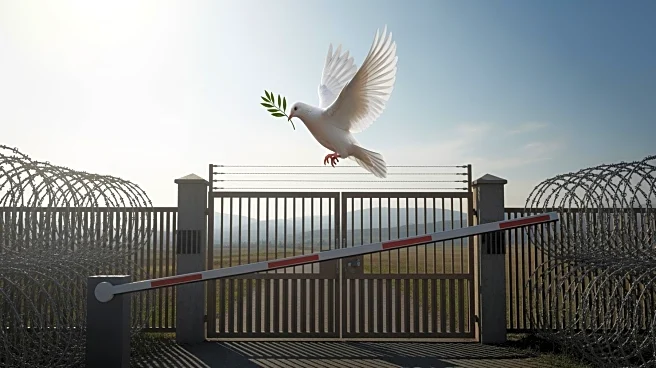What's Happening?
The United Nations agencies have raised alarms over the critical shortage of aid in Gaza, as key border crossings remain closed, impeding the delivery of essential supplies to famine-stricken areas. The World
Food Programme (WFP) is currently providing approximately 560 tons of food daily, but logistical challenges, including destroyed roads and limited operational crossings, hinder the scale-up of aid distribution. The situation is exacerbated by Israel's decision to halve the expected aid due to delays in the release of Israeli hostages' remains by Hamas. The Gaza Ministry of Health reported receiving 15 Palestinian bodies from Israel, some showing signs of abuse. Meanwhile, Israel has received the body of a 10th hostage, identified as Eliyahu Margalit, who was killed in a 2023 attack. Despite a ceasefire, tensions remain high, with recent incidents of violence reported.
Why It's Important?
The ongoing humanitarian crisis in Gaza has significant implications for regional stability and international relations. The shortage of aid and food supplies threatens the well-being of Gaza's population, pushing them towards starvation. The situation underscores the urgent need for diplomatic efforts to ensure the reopening of border crossings and the unimpeded flow of humanitarian aid. The international community, including the UN, plays a crucial role in mediating between Israel and Hamas to address the humanitarian needs and prevent further escalation of conflict. The crisis also highlights the broader geopolitical tensions in the Middle East, affecting global diplomatic and economic interests.
What's Next?
Efforts are underway to increase food production within Gaza, with plans to open additional bakeries to meet the population's needs. The UN and other international bodies are likely to continue diplomatic engagements to facilitate the reopening of border crossings and ensure the delivery of aid. The situation remains fluid, with potential for further violence if tensions are not managed. Stakeholders, including regional powers and international organizations, may need to intensify their involvement to prevent a humanitarian catastrophe and foster long-term peace and stability in the region.
Beyond the Headlines
The crisis in Gaza raises ethical and legal questions about the treatment of hostages and the conduct of military operations. The allegations of abuse of returned bodies could lead to international scrutiny and calls for accountability. Additionally, the blockade and restrictions on aid raise concerns about collective punishment and the rights of civilians in conflict zones. The situation may prompt discussions on international humanitarian law and the responsibilities of occupying powers.












